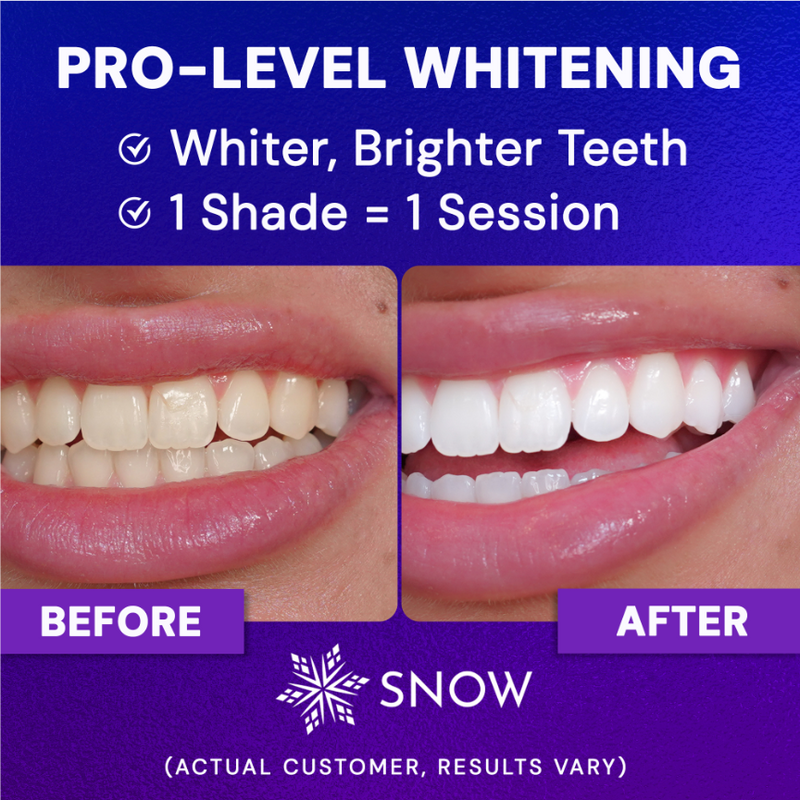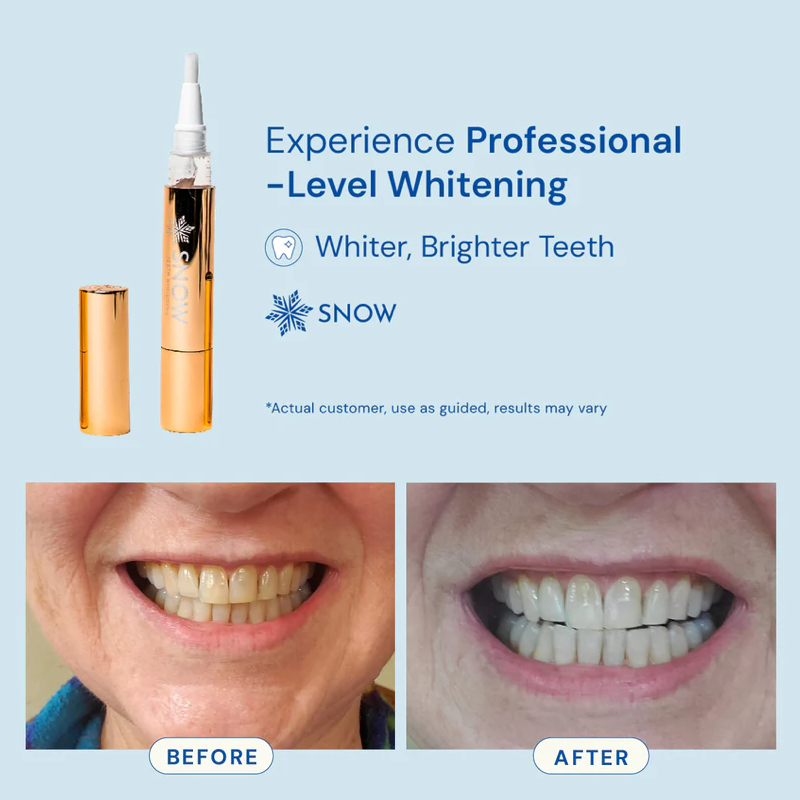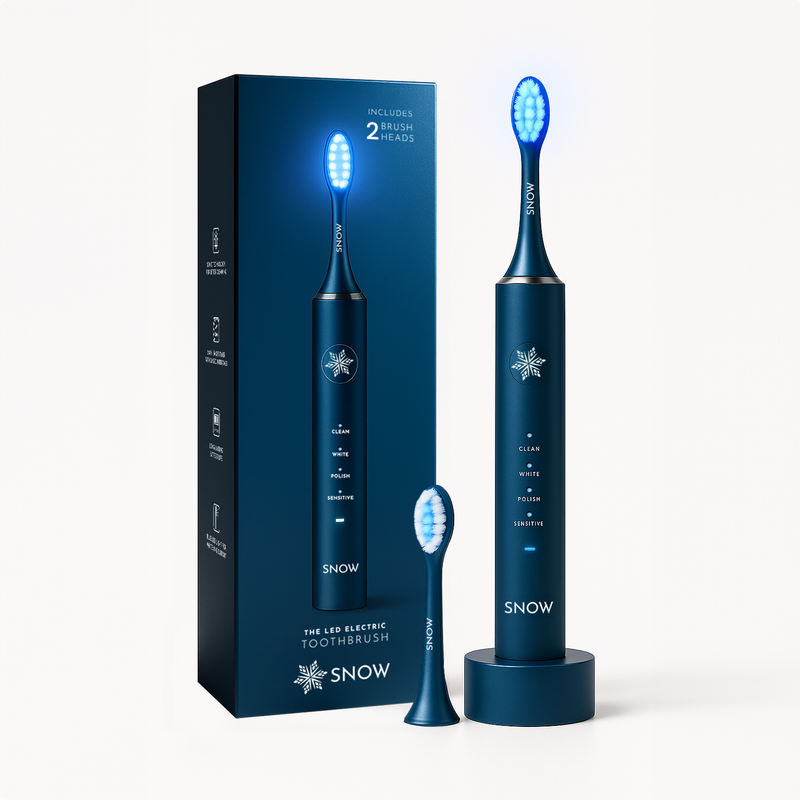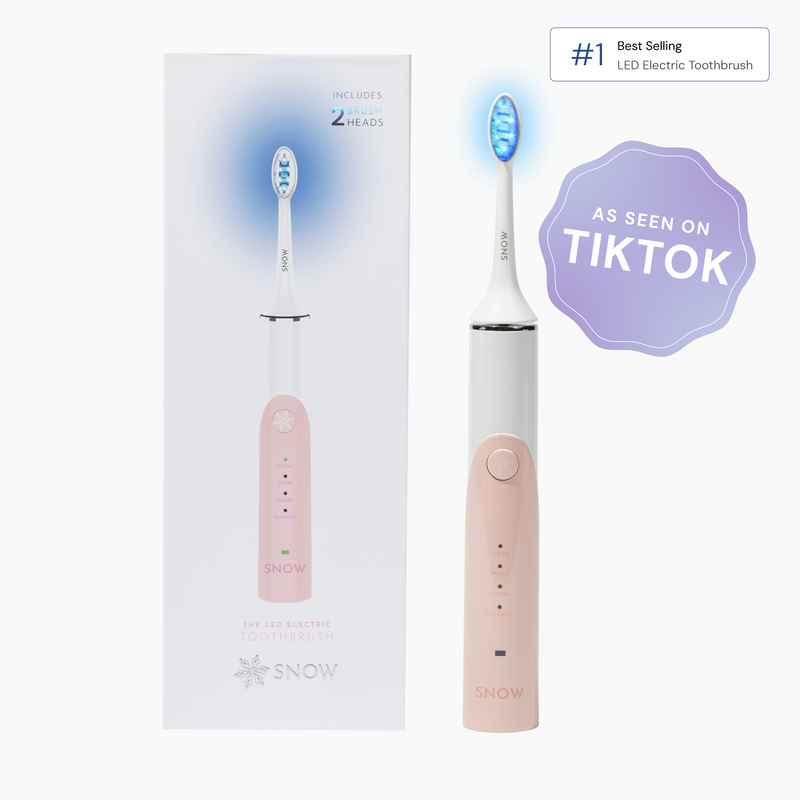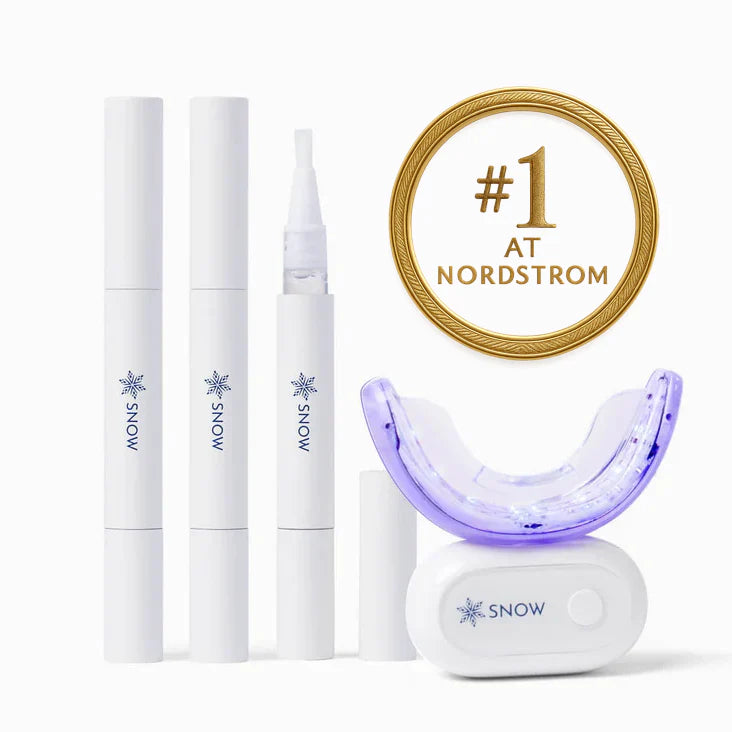If you're asking how much are veneers cost, the answer in 2025 ranges widely—from $500 to $2,895 per tooth. This guide breaks down the different factors that influence the cost, including the type of dental veneers used, the expertise of cosmetic dentists, and your location.
There are two main options: porcelain veneers, which are durable and natural-looking, and composite veneers, which are more affordable but may require more upkeep. Both types are designed to enhance the appearance of natural teeth and can dramatically improve your smile.
Understanding the full scope of costs, materials, and treatment options will help you make an informed decision before committing to your new smile.
Key Takeaways
-
In 2025, veneers cost between $500 and $2,895 per tooth, with an average price of $1,765, influenced by material type, dentist expertise, and location.
-
There are two main types of veneers: porcelain, which are durable and cost $900 to $2,500 per tooth, and composite resin, which are more affordable at $250 to $1,500 but require more maintenance.
-
Proper selection of a cosmetic dentist is crucial; patients should prioritize experience and reviews, while also considering financing options and insurance coverage for overall cost management.
Veneers Cost Overview in 2025
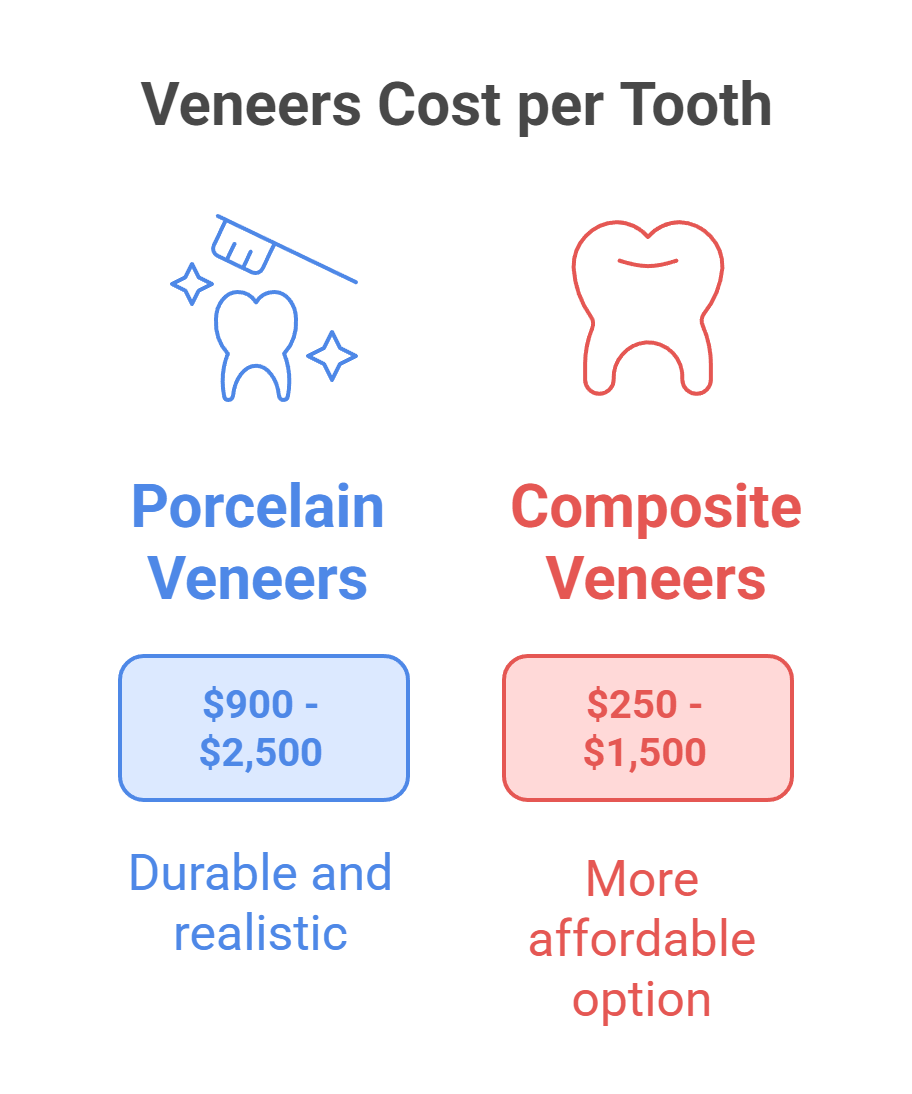
Veneers are an investment in your smile, and understanding the cost is crucial for planning. In 2025, the cost of veneers ranges from approximately $500 to $2,895 per tooth, depending on several factors:
-
On average, you can expect to pay between $800 and $2,500 per tooth.
-
The national average cost is $1,765 per tooth.
-
The substantial range reflects differences in materials used.
-
A dentist's expertise also affects the cost.
-
Market factors contribute to the price variation. If you’re wondering how much do veneers cost, it’s essential to consider these aspects.
Porcelain veneers, known for their durability and realistic appearance, typically cost between $900 and $2,500 per tooth. On the other hand, composite veneers are more affordable, ranging from $250 to $1,500 per tooth. While veneers can be expensive, they offer long-lasting and aesthetically pleasing results that many find to be well worth the investment.
Understanding these costs helps set realistic expectations and prepares you for the financial commitment involved in cosmetic dentistry. Now, let’s delve into the specific types of veneers and their associated costs.
Types of Dental Veneers and Their Costs
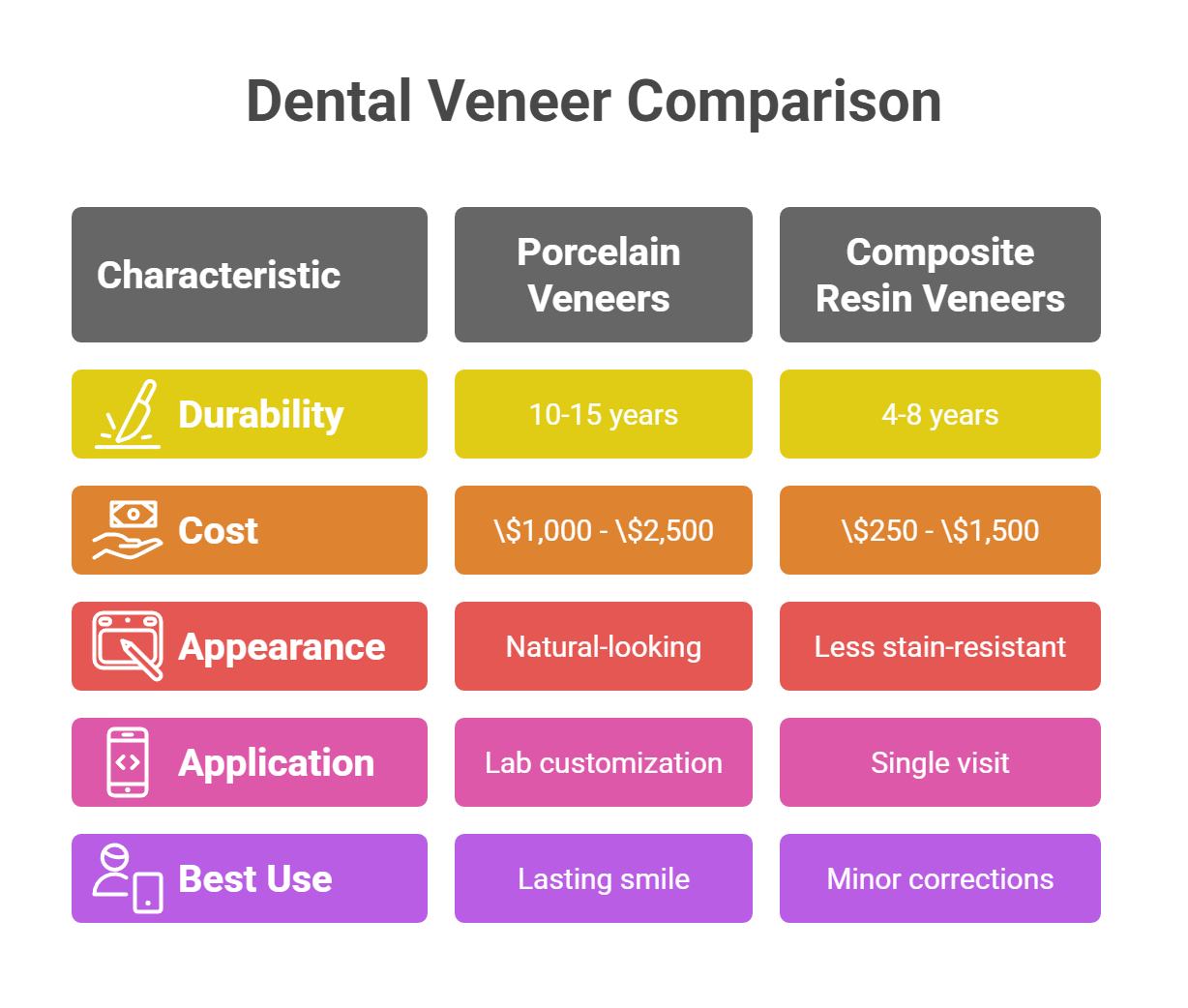
When considering a cosmetic procedure like veneers, understanding the differences in materials, pricing, and durability is key to choosing what best suits your needs and budget. In 2025, dental veneers will remain one of the most popular options for enhancing the appearance of front teeth, correcting discolored or gapped smiles, and creating a lasting smile transformation.
Let’s explore the two main types:
Porcelain Veneers: Durable and Natural-Looking
Porcelain veneers are the gold standard in cosmetic dentistry, known for their long-lasting results and lifelike appearance. They are:
-
Stain-resistant and reflect light like natural teeth
-
Designed to last 10 to 15 years with proper care
-
More expensive due to high-quality materials, lab customization, and the involvement of a master ceramist
-
Typically costs between $1,000 to $2,500 per tooth, depending on cost factors like dental care quality, region, and the extensive training of the provider
While porcelain veneers have a higher upfront price, their durability and minimal upkeep make them a cost-effective choice over time. They also reduce the risk of tooth decay due to their strong bonding and custom fit.
Composite Resin Veneers: Affordable and Convenient
Composite veneers are ideal for patients seeking a budget-friendly option for a new smile or for covering minor dental issues quickly. They are:
-
Applied in one visit, making them suitable for temporary veneers or faster results
-
Lower in cost, usually ranging from $250 to $1,500 per tooth
-
Easier to repair but less durable, lasting 4 to 8 years
-
Require proper care, including regular polishing, to maintain their aesthetic
While they are not as stain-resistant or long-lasting as porcelain, composite veneers are more accessible, especially when paired with payment plans or financing options. They are often used on a single veneer for minor corrections or front surface improvements.
Veneers Cost Comparison Table (2025)

Both porcelain and composite veneers offer unique advantages, and the right choice depends on your budget, treatment goals, and commitment to maintenance. For best results, schedule a consultation with a qualified cosmetic dentist to explore what works for your needs and smile vision.
Factors Influencing Veneer Costs
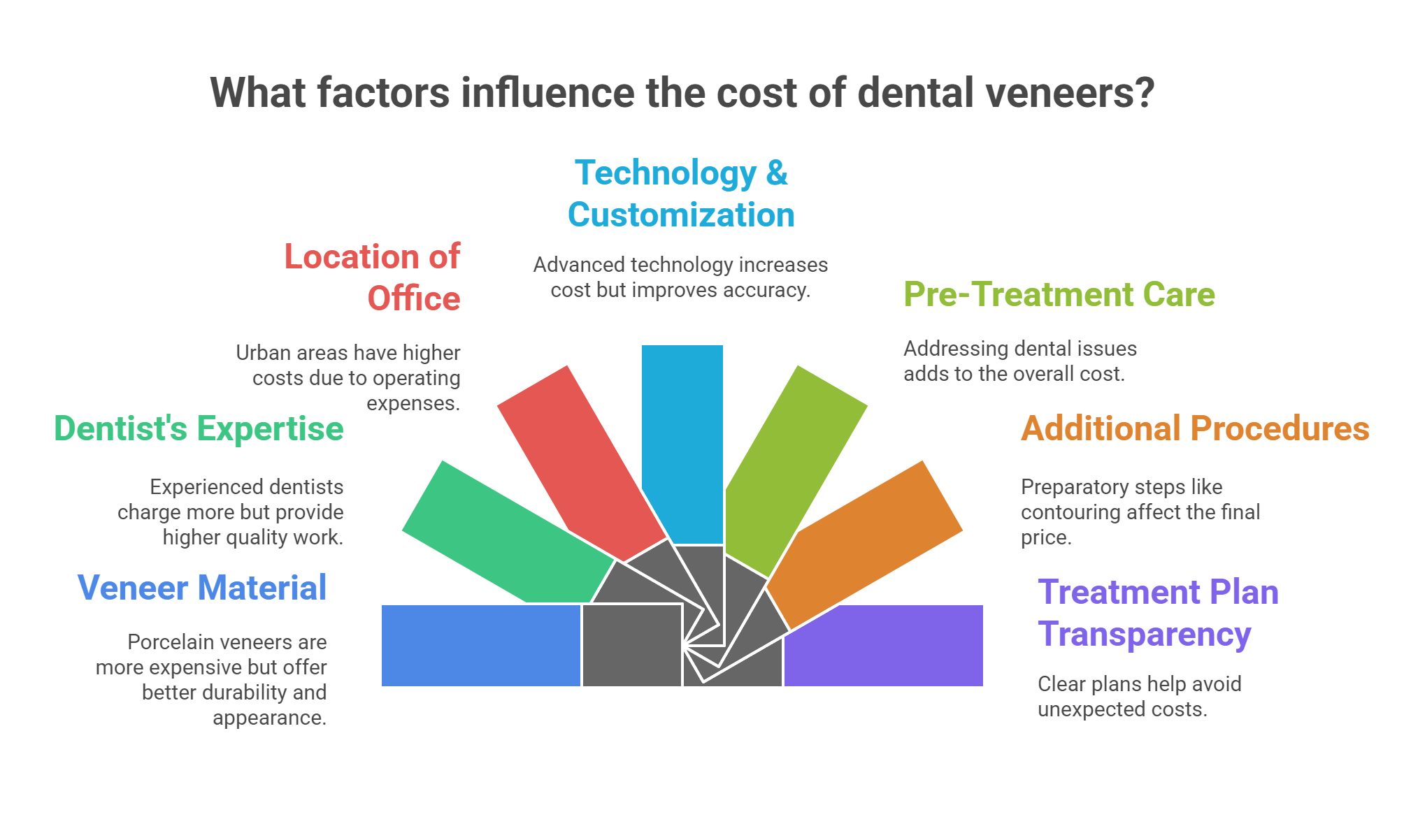
If you're planning to invest in veneers, understanding what drives the price is essential. While the average porcelain veneer cost can range significantly, several contributing elements affect the final cost of your treatment. These include not just the type of veneer material but also the dentist’s skill level, the condition of your healthy teeth, and even where you live.
Here are the top factors that influence dental veneer pricing:
1. Type of Veneer Material
-
Porcelain veneers cost more than composite due to their durability, stain resistance, and natural appearance.
-
Composite resin veneers are more affordable but may require more frequent maintenance.
2. Cosmetic Dentist’s Expertise
-
Dentists with extensive cosmetic experience or specialized training typically charge more.
-
A higher price often reflects the quality of work, fewer complications, and better aesthetic outcomes.
3. Location of the Dental Office
-
Dental clinics in large urban areas or premium neighborhoods often have higher operating costs, which are passed on to patients.
-
Geographic pricing differences can significantly affect your total spend.
4. Technology and Customization
-
Advanced 3D imaging, smile design software, and custom lab work add to the cost but improve accuracy and results.
-
Working with a master ceramist for lab-made veneers may also raise the price.
5. Pre-Treatment Dental Care
-
Before veneers are placed, your dentist must ensure you have healthy teeth and gums.
-
If issues like gum disease or cavities are present, they’ll need to be treated first—adding to the overall cost.
6. Preparatory and Additional Procedures
-
Some patients may require additional procedures, such as tooth contouring, whitening, or replacing old dental work.
-
The complexity of these preparatory steps impacts the timeline and cost of treatment.
7. Treatment Plan Transparency
-
A clear, itemized treatment plan helps avoid surprises and gives a detailed view of:
-
Records & diagnostics
-
Lab fees
-
Provisionals (temporary veneers)
-
Per-tooth veneer pricing
-
Post-treatment follow-ups
-
Any adjunct or additional procedures
-
By evaluating these factors upfront, you can better anticipate the cost breakdown and make an informed decision. Consulting with a trusted cosmetic dentist will ensure you get the right treatment while keeping your budget—and your smile—on track.Full Set Veneers Cost Analysis
Full Set Veneers Cost Analysis
When considering a full set of veneers, the costs can add up quickly:
-
A complete set covering 6 to 8 teeth can range from $6,000 to $20,000.
-
Porcelain veneers typically cost between $8,000 and $20,000 for eight teeth.
-
Composite veneers are a more affordable option, costing between $2,000 and $12,000 for approximately 8 teeth.
The final cost depends on several factors, including the dentist’s expertise, material choice, and the complexity of your case. Investing in a full set of veneers can provide a dramatic transformation to your smile, but it’s essential to weigh the costs and benefits carefully.
Financing Options for Veneers
Financing options can help make the cost of veneers more manageable. Many cosmetic dentists offer financing in-house payment plans, sometimes including no-interest financing for eligible patients. Healthcare credit providers like CareCredit offer third-party financing for dental procedures, providing flexible payment options specifically for treatments like veneers. CareCredit is accepted at over 285,000 healthcare provider locations across the United States.
For those on a budget, dental schools may offer reduced fees for composite veneer cases. These schools provide an opportunity for supervised student providers to perform the procedure at a lower cost, making it a viable option for budget-sensitive patients.
Insurance Coverage for Veneers
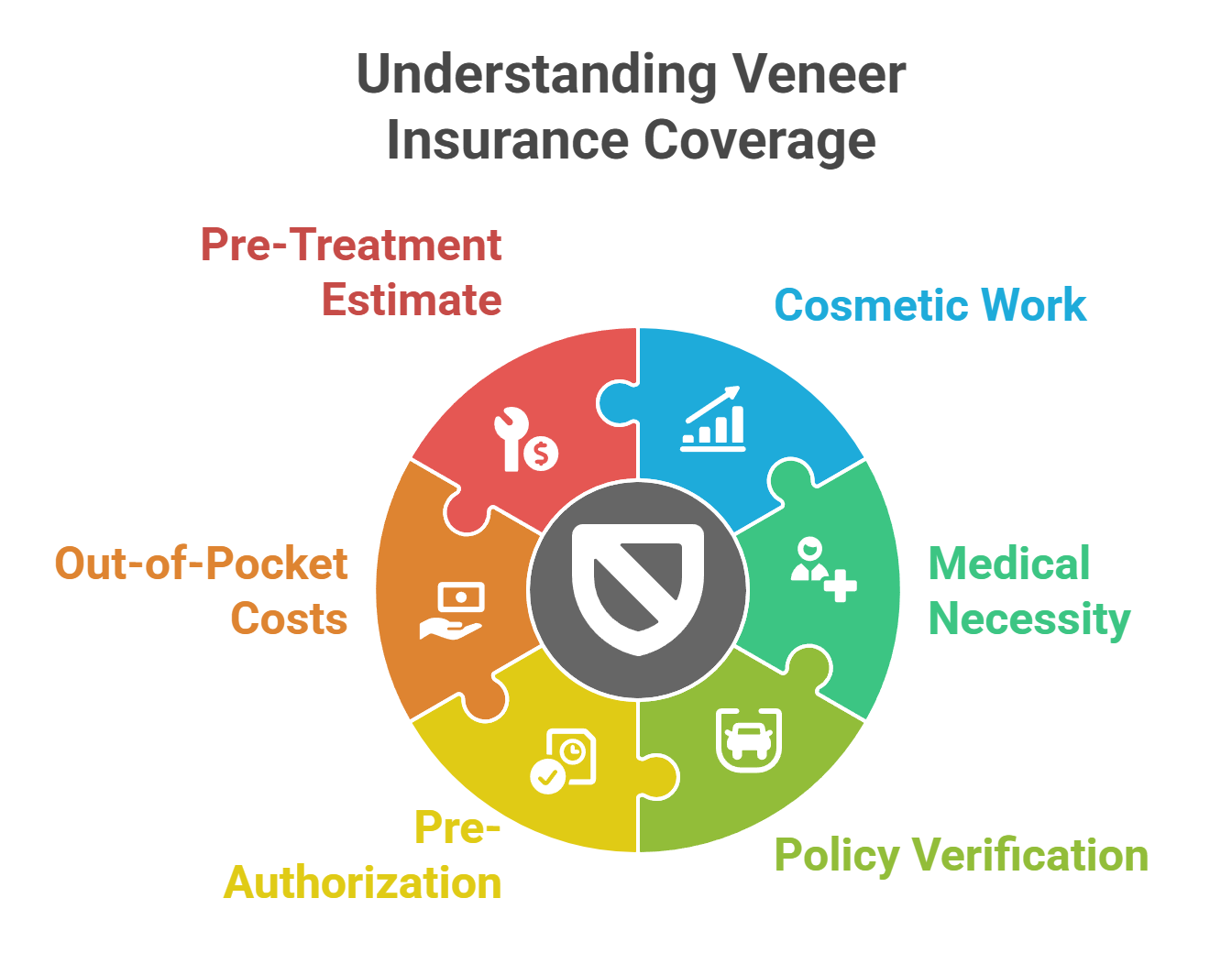
Most dental insurance plans classify veneers as cosmetic work, making them ineligible for coverage. However, in cases where veneers are deemed medically necessary, such as trauma or structural restoration, some plans may cover a portion of the cost. It’s essential to verify your specific insurance policy details, as coverage for veneers can vary significantly.
When exploring coverage:
-
Request pre-authorization with supporting documentation if there’s a restorative or medical indication rather than purely cosmetic goals.
-
Without a documented medical need, plan for the full out-of-pocket cost that is covered.
-
Confirm specifics with a pre-treatment estimate before proceeding.
The Process of Getting Veneers
Getting veneers starts with a consultation where the dentist evaluates if veneers are suitable for you. During this stage, you discuss your goals and preferences, including the shape and shade of your veneers to ensure they are color-matched to your natural tooth color, ensuring they do not appear discolored.
After deciding to proceed, the next step involves:
-
Preparing your teeth by removing a thin layer of enamel for proper veneer attachment.
-
Making an impression of your teeth using either a 3D digital scanner or soft putty.
-
Sending the impression to a lab to create your custom veneers.
The final step is bonding, where a strong adhesive is used to attach the veneers to your teeth permanently. A follow-up appointment is typically scheduled to ensure the proper fit and health of your gums.
Potential Risks and Side Effects
Applying veneers involves removing enamel, which can weaken the tooth and increase sensitivity to hot or cold foods. Some patients may experience increased sensitivity and mild pain after the enamel removal process. Gum irritation can also occur if the veneers are not fitted correctly, leading to inflammation and bleeding.
Infection is possible if bacteria infiltrate beneath the veneer, causing pain and swelling. Additionally, improperly fitted veneers can affect comfort and bite, making it essential to choose a skilled cosmetic dentist to minimize these risks.
Recovery and Aftercare Tips
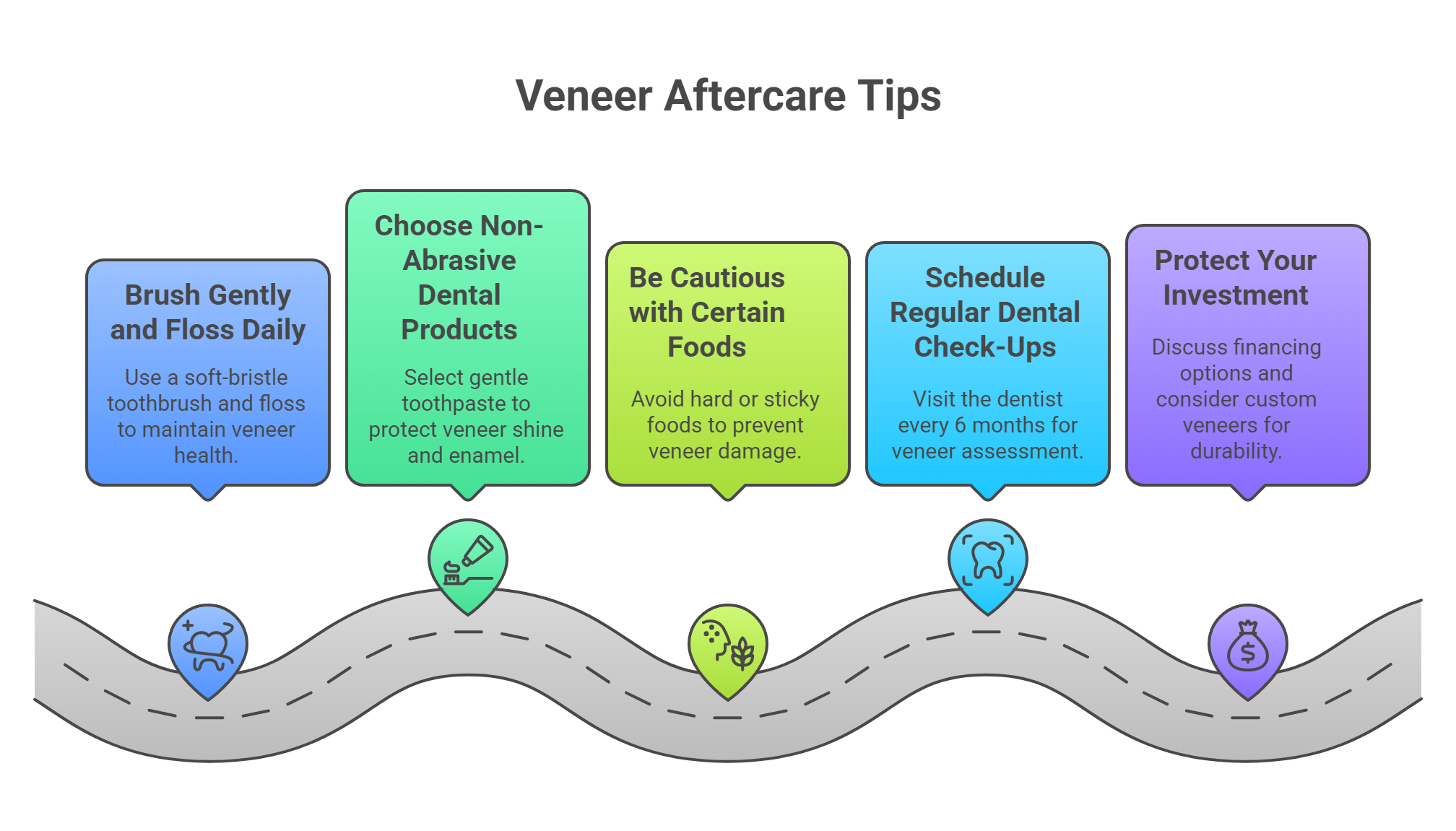
Taking proper care of your veneers after the procedure is essential for preserving your smile goals and protecting your investment. With the right oral hygiene habits, veneers can last up to 20–25 years—whether you choose porcelain or no prep options. However, outcomes can vary depending on maintenance and lifestyle.
Here are key aftercare tips to follow:
1. Brush Gently and Floss Daily
-
Use a soft-bristle toothbrush to clean around the front surface of your veneers without damaging them.
-
Daily flossing is crucial to remove debris and prevent plaque buildup between your properly aligned natural teeth and veneer edges.
2. Choose Non-Abrasive Dental Products
-
A gentle, non-abrasive toothpaste helps maintain the shine of your veneers and protect the enamel beneath.
-
Avoid whitening pastes or harsh abrasives, which can dull the finish and lead to uneven wear over time.
3. Be Cautious with Certain Foods
-
Minimize chewing on certain foods that are excessively hard or sticky—like ice, nuts, or taffy—as they may chip or loosen your veneers.
-
If you’re experiencing sensitivity, avoid extremely hot or cold items for a few days post-procedure.
4. Schedule Regular Dental Check-Ups
-
Visit your dentist every 6 months to monitor the health of your veneers and surrounding teeth.
-
A qualified cosmetic dentist with extensive training—especially one who works with a master ceramist—can assess wear, fit, and color over time.
5. Protect Your Investment
-
The cost of veneers and their maintenance can vary depending on the provider, material, and complexity.
-
Discuss financing options with your dental office early in the process. Many clinics offer financing plans to manage the total cost more comfortably.
-
Custom veneers crafted by a master ceramist are often worth the higher price due to their precision, durability, and aesthetics.
By following these steps, you’ll protect your veneers and extend their lifespan while preserving the natural look of your porcelain enhancements. Whether you’ve had a single veneer placed or a full smile makeover, proactive care ensures your smile goals remain on track.
How to Choose the Right Cosmetic Dentist
Selecting the right cosmetic dentist is key to achieving the best results in cosmetic treatment. Consider the following when making your choice:
-
Prioritize dentists with a proven track record in cosmetic procedures to ensure quality outcomes.
-
Look for a dentist specializing in esthetic enhancements, as experience in cosmetic dentistry is crucial.
-
Use consultations to assess the dentist’s approach and expertise.
Look for patient reviews to gain insight into the dentist’s skills and patient satisfaction. Consider dentists who tailor veneer options based on individual facial aesthetics and use advanced technology for better precision. Obtain 2–3 consultations with cosmetic-focused dentists to compare design approach, materials, lab partners, timelines, and warranties alongside price.
Final Thoughts
In summary, veneers are a significant investment in your smile that can offer long-lasting and visually appealing results. Understanding the costs, types, and factors influencing veneer prices in 2025 helps set realistic expectations and prepares you for the financial commitment involved. Porcelain veneers, though more expensive, offer greater durability and aesthetics, while composite veneers provide a more affordable option with shorter longevity.
Investing in quality veneers can transform your smile and boost your confidence. By choosing the right cosmetic dentist and following proper aftercare, you can ensure that your veneers last and continue to enhance your appearance for years to come.
Frequently Asked Questions
How much do veneers cost per tooth in 2025?
In 2025, veneers cost between $500 and $2,895 per tooth, with the national average at $1,765. This wide range reflects variations in materials and location.
What is the difference between porcelain and composite veneers?
Porcelain veneers offer greater durability and a more natural look but come at a higher cost of $900 to $2,500 per tooth, whereas composite veneers are more budget-friendly, priced between $250 and $1,500 per tooth.
Are veneers covered by dental insurance?
Veneers are generally not covered by dental insurance since they are classified as cosmetic procedures. However, coverage may be possible if the veneers are deemed medically necessary.
What factors influence the cost of veneers?
The cost of veneers is primarily determined by the type of material used, the dentist's expertise, geographic location, and any advanced technology or preparatory care required. These factors collectively influence the overall investment in your dental aesthetic.
What financing options are available for veneers?
Veneers can often be financed through in-house payment plans or third-party providers like CareCredit, which offers flexible payment options. This allows patients to manage the cost effectively while receiving the desired cosmetic treatment.















































